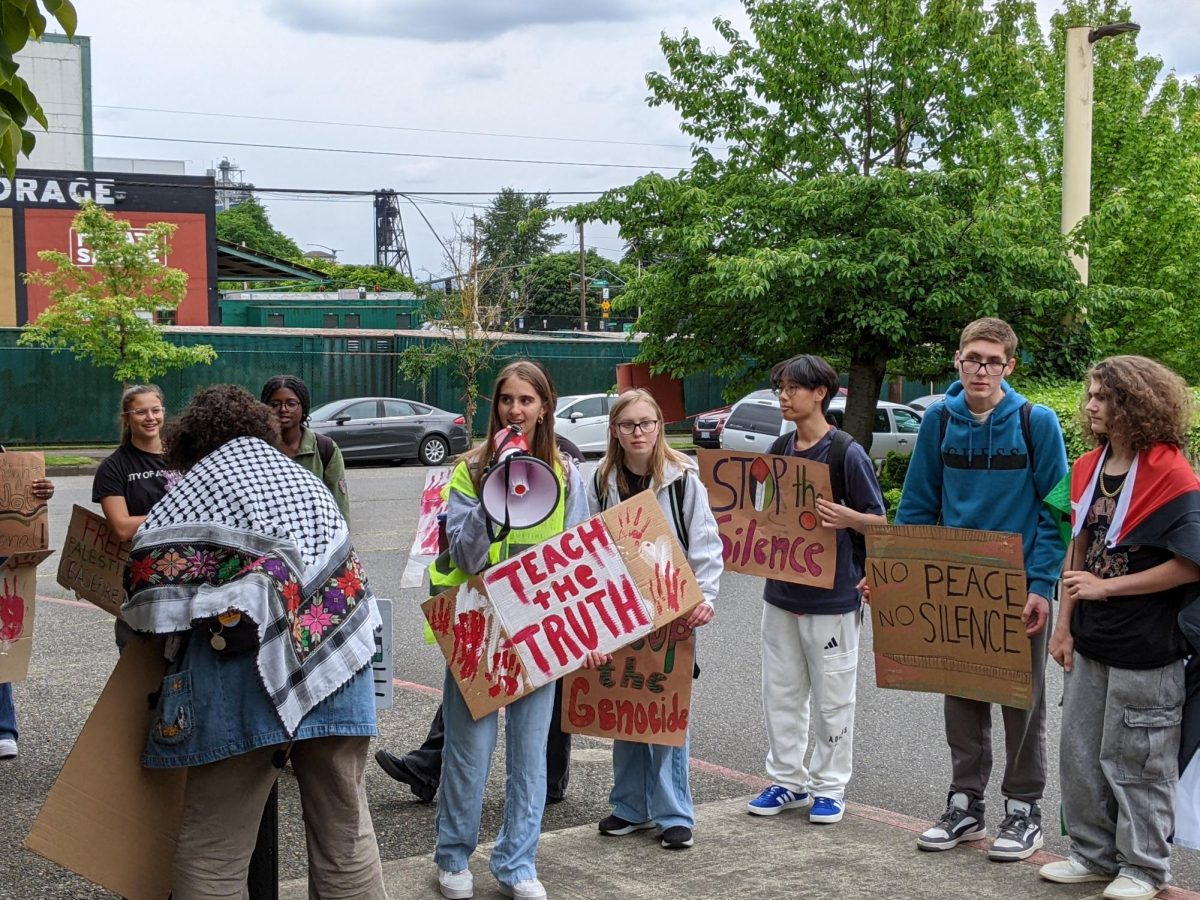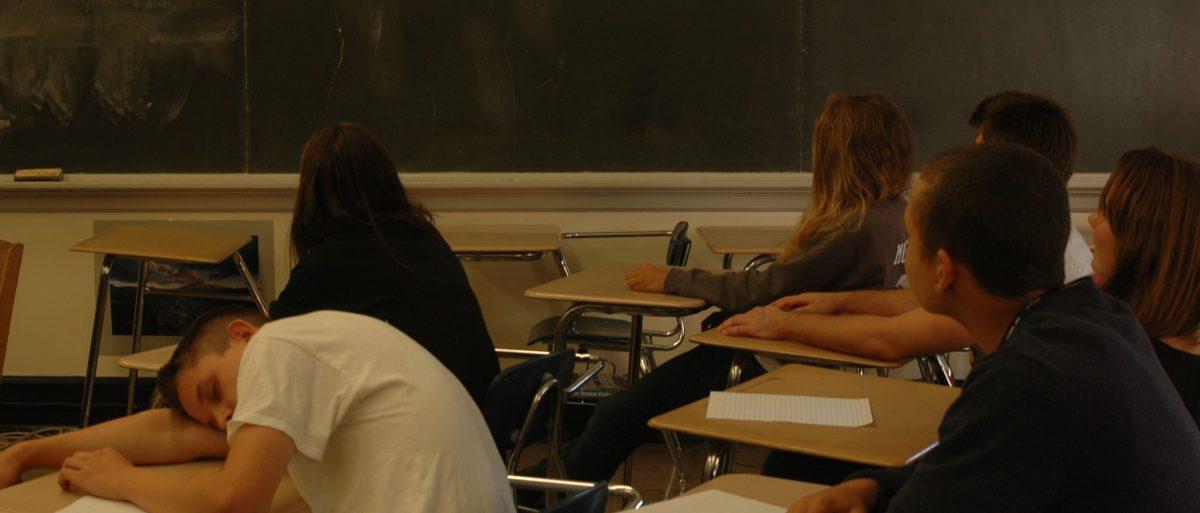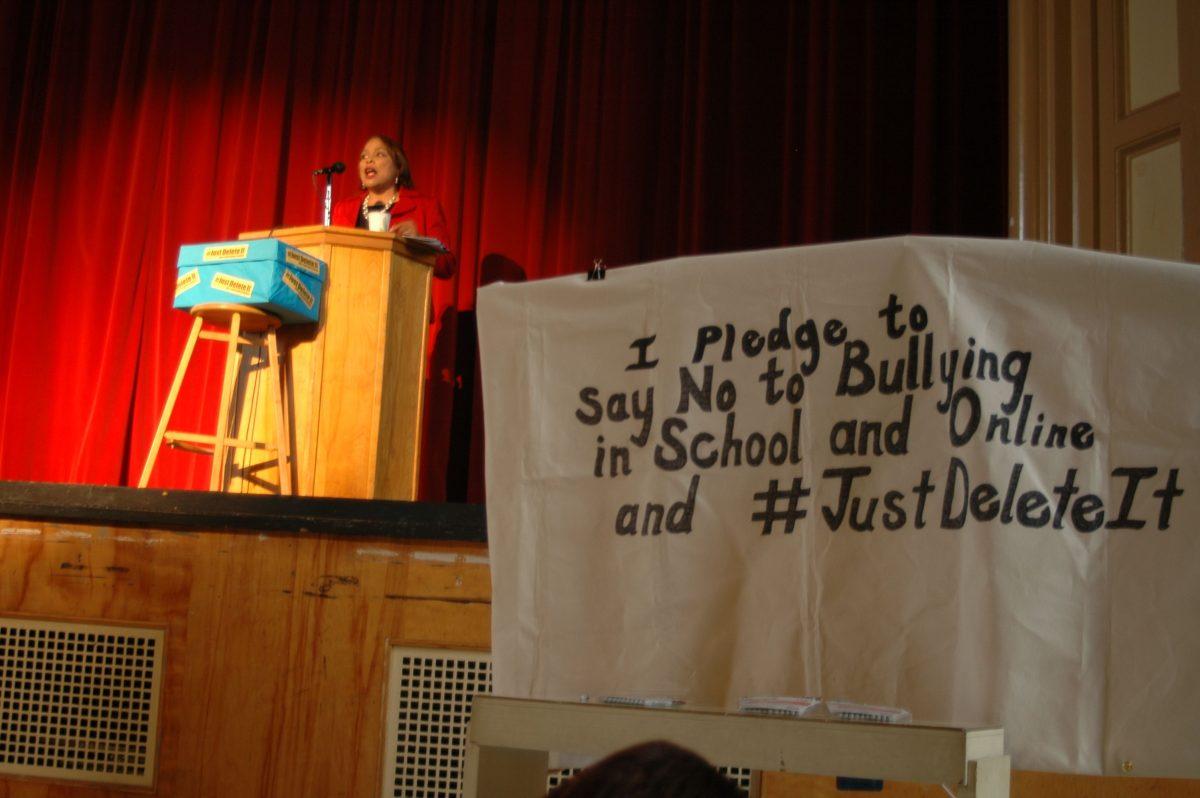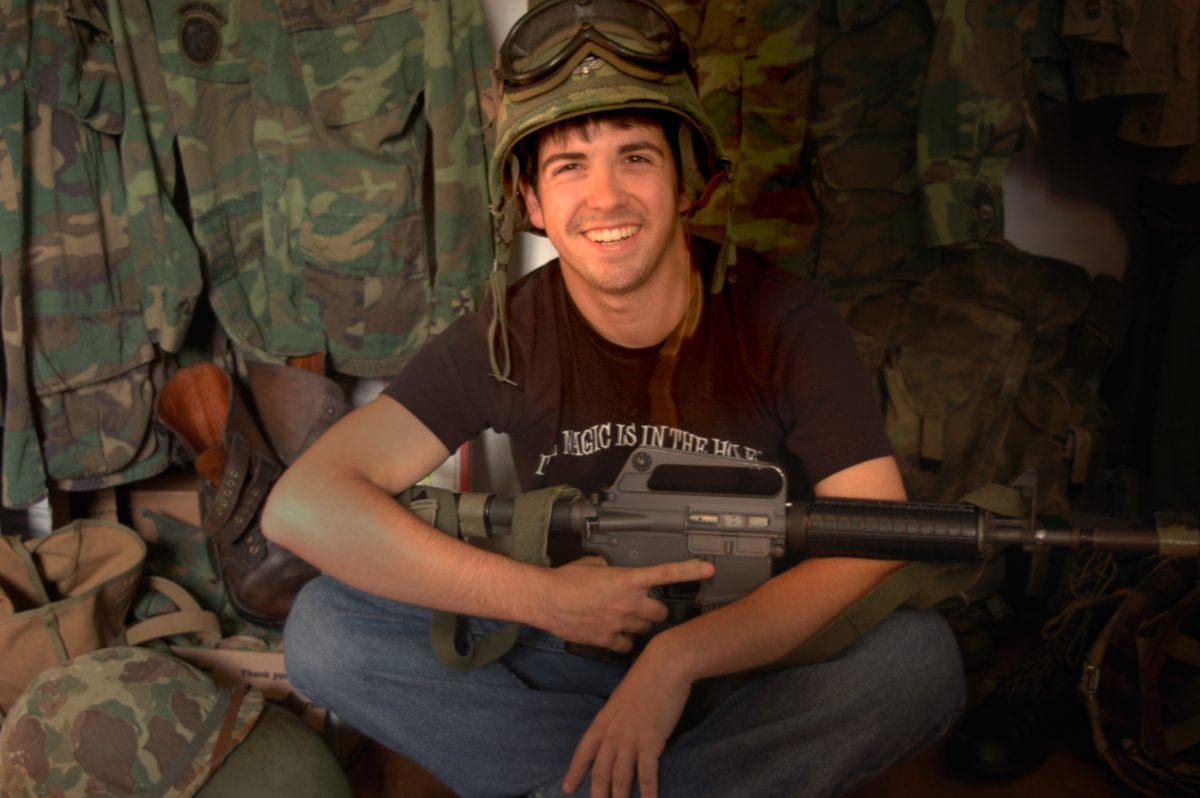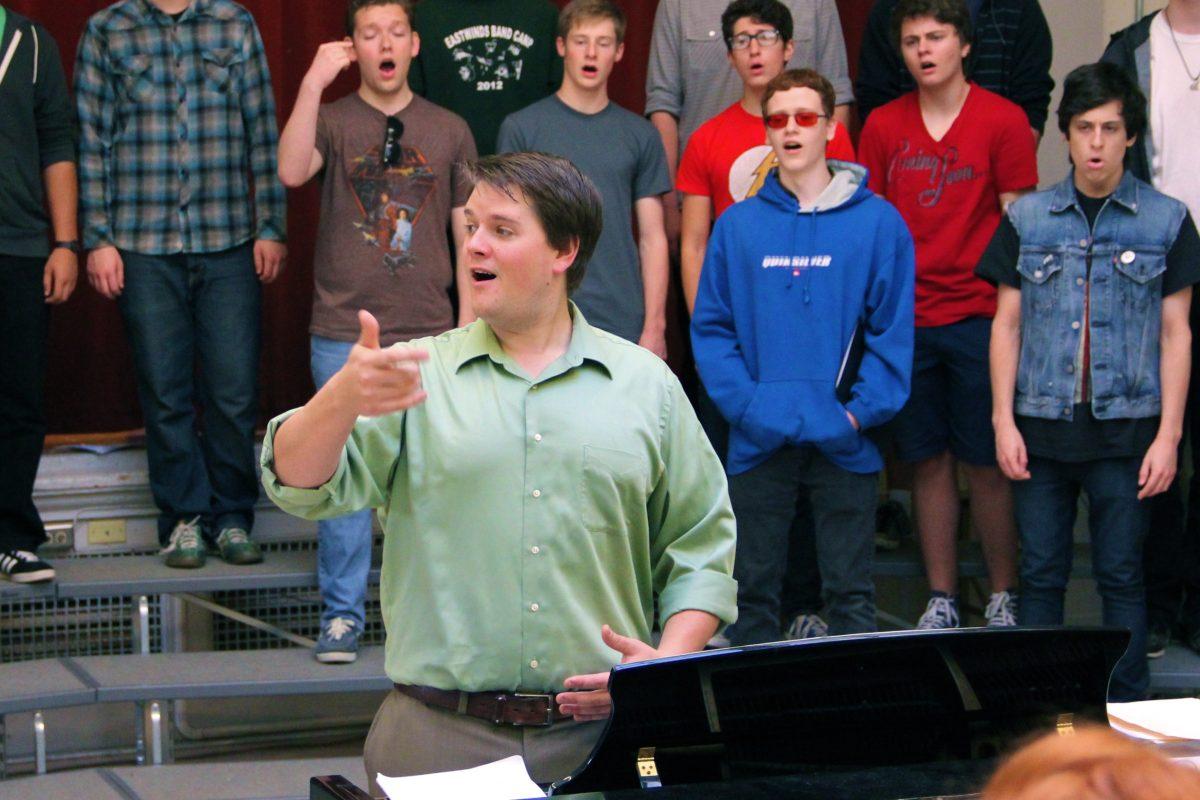Jeremy Reinholt wakes up at 5:15 every morning to bike from North Portland to his part-time teaching job at Grant High School. When he arrives, he finds the parking lot nearly empty.
Reinholt shows up early because he’s committed to making sure everything is prepared for his class. “I hate falling behind on grading,” he says. “Not only does it make me feel like a jerk, it’s so hard for students to know how they’re doing in my class if I just let ungraded work pile up.”
For five years, Reinholt worked as a substitute teacher until this year when he landed a part-time Modern World History position at Grant. The rest of his week is spent as a sub in the district, bouncing from school to school – a process he describes as “tiring.”
For Reinholt, a 1998 Grant alumnus, teaching history at Grant has been a goal ever since graduate school. Students and parents applaud him for his enthusiasm and ability to inspire freshman. First-year student Anna Shaff says bluntly: “His energy is what really separates him from my other teachers.”
Reinholt, 32, still can’t find a full-time job in the district.
Welcome to Portland Public Schools, a place where long-term teachers – regardless of their performance – dominate the system and young teachers struggle to find a path into the classroom.
“You feel like you’re walking on a tightrope,” says Reinholt, who doesn’t feel secure in his position as a young teacher. “Once you cross that tightrope successfully, then you’re pretty much bulletproof.”
With the district’s increasingly tightening budgets and continually reduced staff, the union has been a common target of criticism. Principal Vivian Orlen compares the strict seniority provisions to a game of “Russian Roulette.”
“The biggest problem that I see is that you don’t get to choose the most qualified teacher, you have to choose the most senior teacher,” Orlen says. “That’s a loss for Grant High School students.”
Union officials argue that teachers need the organization as protection from overzealous administrators. “Teachers unions are portrayed as being the enemy of improvement,” says English teacher James Zartler who has been teaching for over 20 years. He is a union representative at Grant and serves on the board of directors for the National Education Association. He also is a member of the executive committee for the Oregon Education Association.
“There are a whole lot of things in the working lives of Americans that are there because of the history of unions in this country,” Zartler says, pointing to eight-hour work days, health care and living wages.
Dylan Leeman, also an English teacher, says he is unafraid to criticize the union’s weaknesses, but he understands their fundamental importance. “As educational institutions become ever more under attack, I think the union has a vital role in protecting public education,” he says.
But teachers unions nationwide are taking a hit. A recent Harvard University study conducted last year found the overall approval rating of teachers unions dropped seven percent in just 12 months.
Even union members are losing confidence in the body that represents them. Among teachers, the approval rating for unions declined 16 percent over the same time period.
Donald Gavitte, a Social Studies teacher in his 12th year at Grant, sees both sides. He acknowledges: “I know full well that I have worked with people who I shouldn’t be working with.” But he adds that critics paint the union as “an organization advocating for teachers, not necessarily an organization that is advocating for education.”
Many think Reinholt, who gets largely glowing reviews, is someone worth advocating for when it comes to teaching.
“A lot of students really like him because he’s the first serious teacher to challenge their intellect,” Orlen says. “The emphasis he places on current events is what really excites young minds and engages students.”
Carol Bernick, Shaff’s mom, met Reinholt at this year’s “Back to School” night. “To say I was blown away would be an understatement,” she says. “If Grant were to lose Mr. Reinholt because of seniority alone, the rising criticism of the teachers union needs to be heeded and the cause to change its ways needs to be taken up.”
Waiting for a full-time job gets old for some young teachers like Mario O’Brien, forcing them to seek other careers. O’Brien, who is 30 and known as “El Rio” to his Grant Spanish students, taught at the school in 2009-2010.
Besides his approach to foreign language instruction, former students also remember him as a rapper, guitar player and an inclusive leader of discussions. Teaching students is his passion, he explains. “No two days of teaching are the same,” O’Brien says. “I love the energy of schools. I love the spontaneity of kids.”
When heavy cuts were made to the district in 2010, the school’s Spanish department was hit hard. O’Brien, the newest teacher, was the first to go. After leaving, he split time between two other schools, an experience that dampened his enthusiasm for teaching. “It was the worst,” he says. “I didn’t feel like I was part of either school.”
This year, he was offered three half-time positions but turned them down. Instead, O’Brien has shifted his goals away from education. He no longer embraces teaching as his path forward and instead is focusing on a business career. He helped create a production company that makes Ultimate Frisbee instructional videos. One clear benefit, according to O’Brien: “I feel like I am in more control of my own fate.”
The current union contract places more focus on experience in the district than performance in the classroom. In Orlen’s mind, a good system would be a combination of student performance, student opinion, peer evaluation and assessment by the community.
Gavitte agrees with having multiple factors play a role, but also cautions against a system that would cause worry for a number of union members. “It just can’t be one hundred percent test scores,” he says. “It can’t be one hundred percent anything.”
Grading by test scores reduces a teacher’s ability to create innovative curriculum, and it creates pressure to teach to the test, says Leeman.
Zartler agrees test scores don’t accurately reflect teacher performance and don’t help him do his job. “It’s a lot harder to measure how I’m helping them if they don’t fit into a mold. We can use standardized tests when we have standardized kids,” he says.
He questions the ability of students to critique how he does his job. “I’m not sure that students are in a position developmentally to be fair and objective,” says Zartler.
Leeman says he encourages his students to review his performance online. He sees the opinions of students as an“underused resource.”
“Whether it becomes a formal part of evaluation or not, I think there’s value in how our students respond to our teaching and we’re largely ignoring that right now,” he says.
Besides hiring and evaluating, removing ineffective teachers stands at the core of the debate. Because of the union, administrators say, getting rid of incompetent teachers is difficult. Orlen believes there should be a fair process for removing teachers. But “the fact that it takes as long as it does is unacceptable,” she says.
Therese Cooper, who has chaired the Grant English Department for 14 years, thinks the union would be more effective if it acknowledged that some of its members should be on plans of assistance, a probationary period before firing. “But no matter how incompetent you are, the union will fight to keep you,” she says.
Gavitte counters, explaining that “in my 12 years here, there have been plenty of people who have not been asked to come back.”
Principals have what they need to make these important decisions, he says. Some choose to get involved and some don’t. “There’s some people gone this year that were not necessarily new teachers,” Gavitte says. “The principal decided they didn’t fit, they didn’t work, they’re not here.”
However, many teachers who are removed from a building end up getting shuffled into other schools.
 Gwen Sullivan
Gwen Sullivan
President of PAT
Gwen Sullivan, the president of the PAT, defends the process. “If you are laid off, under our contract, you are still guaranteed a job in the district,” she says. In the union’s attempt to protect all of its members, the most senior teachers with qualifications for an opening are given priority.
Sullivan stresses the importance of what an experienced teacher brings to the classroom and she feels that “if they are not inspired, we’ve got to figure out what we need to do to get them inspired and what has taken the inspiration away.”
Cooper says it’s important to remember the value that younger teachers bring to a staff. “It is essential to have younger minds” and “beneficial to have a new perspective coming in,” she says.
Zartler argues that it’s only fair that senior teachers get more protection. They’ve paid their dues by teaching for a longer period of time. “When teachers agree to teach, they give up a lot of other possibilities,” he says. “When you agree to give up something to be a public school teacher, it’s fair to get something in return.”
Cooper believes seniority can sometimes promote complacency. “Teachers should always, if they really are in the business of being an educator, feel like educating themselves, and they should continue that education,” she says.
Grant Magazine staffer Sawyer Montgomery contributed to this report.


































